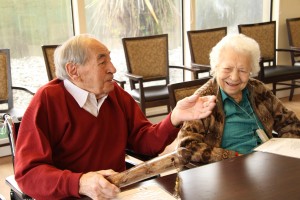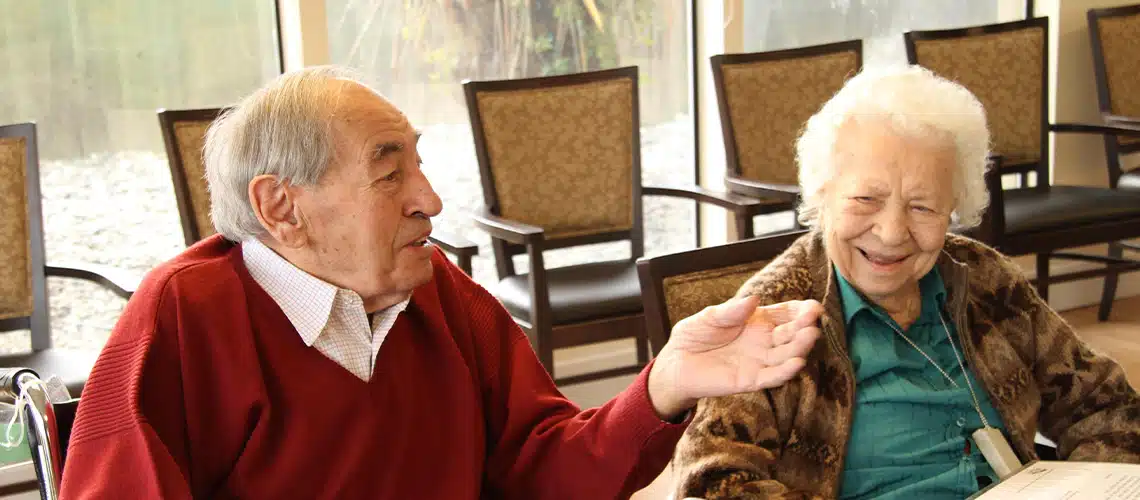 New research indicates that friendships formed with peers actually have more beneficial health effects than the relationships with family.2 At first glance this doesn’t seem to make sense as relationships with family are long-term and peers in a mutual support group are likely fairly new acquaintances.
New research indicates that friendships formed with peers actually have more beneficial health effects than the relationships with family.2 At first glance this doesn’t seem to make sense as relationships with family are long-term and peers in a mutual support group are likely fairly new acquaintances.
Peer relationships however, have a powerful emotional component that connects residents in a meaningful way – more so than family support which may be intermittent. It does make sense that relationships with those who face the same challenges have a stronger impact on social identity loneliness. For residential care this is significant.
The Hearthstone Institute in Ohio made a fascinating discovery when they found that the levels of positive engagement observed in resident-led programming were typically higher than standard activities led by staff.3 The implications of this are profound and highlight what an emerging body of research is telling us: Peers can help one another in a way that no one else can.
Post (2011) describes the benefits of this phenomenon within mutual support groups: Members use the power of their own experience and of their own wounds to lighten the burden of others, and heal themselves in the process. (p. 38).”1
With the right supports in place, residents with and without dementia are capable of contributing to their communities and of helping and supporting their peers.3,4 Those living in residential settings are typically cast as passive recipients of care5.
A shift in focus of psychosocial care
We are learning that residents are capable of making a significant contribution to the care of their peers. Why does this matter? With the limited health care resources and the high resident to staff ratios, the more we enable residents to contribute the better off we will all be. It means though that we need to stop doing only things for them and to them and shift our focus to what we can do to help them help each other.
A shift from task-oriented care and getting the job done to a process-oriented approach may take more time but the benefits of a shift in psychosocial care are many. Loneliness, depression and responsive behaviours are variables that significantly influence health and care costs. These conditions are often caused primarily by a lack of sense of belonging, which results from a lack of opportunities for residents to contribute.
By focusing on building community, peers helping peers, a culture of positive mutual support can be developed that not only supports residents’ social and emotional health, but also saves money in the process. A balanced equation that when implemented, can significantly impact all aspects of senior care.
Here are four guiding principles that can be used as a foundation to building a culture of positive mutual support. Residents contributing and giving back to their community gives them a valued social identity and role. These principles are given to staff, to consider throughout the work day when planning a task. Clearly some tasks are not appropriate for residents to help with (e.g. dispensing pills, or giving a bath). However, with a little imagination there are 101 things that residents can do when we put the right supports in place, even and especially those with dementia. There are carts to push, things to hold, tables to be set, or simply company along the way. Asking a question such as: “Hello _______(resident name). I am going down the hall to help Mrs. Ames and could use your help (some company, someone to push this cart etc.) Come with me – I’d love that!”
Here are the four guiding principles:
- Can a resident do this if I show them how?
- Can a resident do this if I give them a little help?
- Can a resident do this if we do it together?
- Can a resident come with me while I do this?
By Kristine Theurer, MA (Gerontology), MTA
References
1Post, S. G. (2011). The hidden gifts of helping. San Francisco, CA: Jossey-Bass.
2Li, T., & Zhang, Y. (2015). Social network types and the health of older adults: Exploring reciprocal associations. Social Science & Medicine, 130(1), 59-68. doi: 10.1016/j.socscimed.2015.02.007
3Skrajner, M. J., Haberman, J. L., Camp, C. J., Tusick, M., Frentiu, C., & Gorzelle, G. (2014). Effects of using nursing home residents to serve as group activity leaders: Lessons from the RAP project. Dementia, 13(2), 274-285. doi: 10.1177/1471301213499219
4Theurer, K., Wister, A., Sixsmith, A., Chaudhury, H., & Lovegreen, L. (2012). The development and evaluation of mutual support groups in long-term care homes. Journal of Applied Gerontology, 33(4), 387-415. doi: 10.1177/0733464812446866
5Bartlett, R., & O’Connor, D. (2010). Broadening the dementia debate: Towards social citizenship. Portland: The Policy Press.
6Alzheimer Disease International. (2013). World Alzheimer Report 2013. Journey of Caring: An Analysis of Long-Term Care for Dementia. London: Alzheimer Disease International.


Excellent article. We are fortunate to have a strong resident-lead program.
Fabulous Vickie. It’s easy to underestimate the abilities of residents and that’s why the Java Music Club program keeps “residents helping residents” as its main focus.